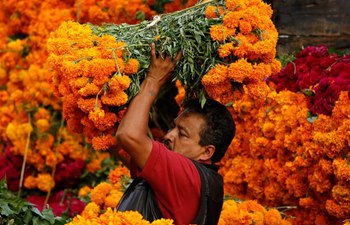CAPE TOWN, Oct. 31 (Xinhua) -- South African health authorities on Tuesday issued a malaria alert after high numbers of malaria cases were reported.
Everyone is at risk of contracting malaria in malarious areas but children under five years of age, pregnant women, people with compromised immune systems, travellers from non-endemic areas and immigrant workers are at higher risk, the Department of Health said.
High numbers of malaria cases are being reported in the malaria transmission areas in northern South Africa, according to the department.
Vhembe and Mopani districts in Limpopo Province and Bushbuckridge in Mpumalanga Province are the most affected, the department said without disclosing the number of reported malaria cases.
Compared to previous years, a modest increase in cases in the Kruger National Park and private game reserves in the area has been confirmed, department spokesperson Popo Maja said.
This follows a very busy 2017 malaria season in the entire Southern African region, which peaked in April and May and extended into June.
High rainfall, humidity and ambient temperatures provided ideal conditions for malaria mosquito breeding and contributed to an increase in malaria cases, Maja said.
According to the South African National Institute for Communicable Diseases, unusual malaria cases, affecting persons with no recent history of travel to malaria transmission areas, have been reported in Pretoria and some other nearby places. One patient has died.
The key prevention strategy of the malaria control programs in endemic areas is spraying of households with long acting residual insecticides, or indoor residual spraying (IRS), which target indoor feeding mosquitos.
This IRS program is in progress in both Limpopo and Mpumalanga and is planned to target a larger area than in 2016, Maja said.
Travellers from or residents of malaria transmission areas in Limpopo and Mpumalanga, and the far northern KwaZulu-Natal and neighboring countries such as Mozambique, Botswana, Zimbabwe and Namibia who present with fever and "flu-like" illness must have an urgent blood test and malaria treated as a medical emergency, Maja said.
Misdiagnosis of malaria as influenza is not uncommon with disastrous consequences in a number of persons, he cautioned.
The Department of Health in South Africa is ensuring universal coverage of key interventions, which include indoor residual spraying, effective case management and distribution of prevention messages to communities at high risk, Maja said.
"All travellers to malaria risk areas must take precautions to prevent mosquito bites and medication to prevent malaria should be highly considered," Maja said.
Malaria symptoms include fever, headache, chills and vomiting, which appear within 10-15 days after the infective mosquito bite.
The life-threatening disease, transmitted to people through the bites of infected Anopheles mosquitoes, is preventable, treatable and curable.

















